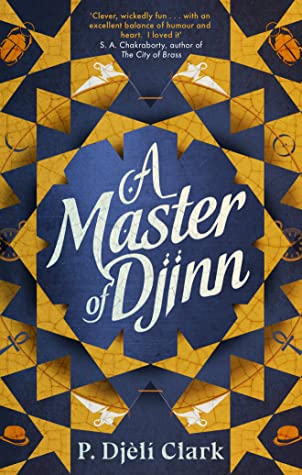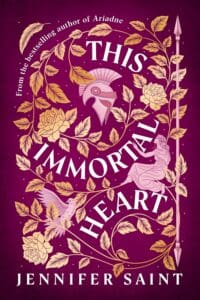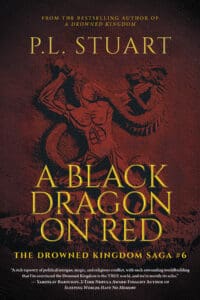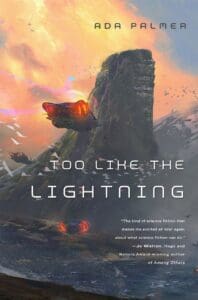
Amazon
Barnes and Nobles
Blackwells
Book Depository
Books-a-Million
Bookshop
Goodreads
Hachette
Ibooks
IndieBound
Kobo
Macmillian US
PdjeliClark.Com
Powels
Tordotcom
Waterstones
Rating: 10/10
Synopsis
Nebula, Locus, and Alex Award-winner P. Djèlí Clark returns to his popular alternate Cairo universe for his fantasy novel debut, A Master of Djinn
Cairo, 1912: Though Fatma el-Sha’arawi is the youngest woman working for the Ministry of Alchemy, Enchantments and Supernatural Entities, she’s certainly not a rookie, especially after preventing the destruction of the universe last summer.
So when someone murders a secret brotherhood dedicated to one of the most famous men in history, al-Jahiz, Agent Fatma is called onto the case. Al-Jahiz transformed the world 50 years ago when he opened up the veil between the magical and mundane realms, before vanishing into the unknown. This murderer claims to be al-Jahiz, returned to condemn the modern age for its social oppressions. His dangerous magical abilities instigate unrest in the streets of Cairo that threaten to spill over onto the global stage.
Alongside her Ministry colleagues and her clever girlfriend Siti, Agent Fatma must unravel the mystery behind this imposter to restore peace to the city – or face the possibility he could be exactly who he seems….
Review
Thank you to Nazia at Orbit books for giving me an ARC. All thoughts are my own.
This is a world full of Egyptian and Arabian mythology that is a refreshing setting. It’s not something you see often where you get an Alternate History novel combining Steampunk, Mythology and Magic. This is a world full of bazaars, camels, djinns in marvellous magic, a world in which you have never seen before. In its scope, one could interpret this series to explore the broader implications of this world; this is a world where Egypt threw off the shackles of British Colonialism and furthered the advancement of the decline of the Ottoman Empire. A world that is close to the edges of WW1. The discovery of Djinns and their ability to integrate into Egyptian society was a sharp wake up call for the Western Powers. They resolved to conquer Africa, but African countries defeated their forces. India liberated itself and the British Raj is now struggling to hold on to whatever precious territory it has left. In one sense, this novel has a huge scope for a potential tv series adapted by Netflix, and in another, it makes me want to explore the world outside of it. This is what I want to see more of in fantasy novels, but more of that, I am proud that the author combined historical fantasy with steampunk to take something uniquely different; What if Egypt overthrew the shackles of colonialism that had taken over hold of it?
But this is a novel that is fighting for the heart and soul of Egypt. Even though Egypt has become independent, it is struggling to reform its society. People still hold deep patriarchal views, and there are many nationalist movements unsatisfied with the King and Queen of Egypt and its Government. However, Egypt is trying to exert its influence in helping fund revolts in the French Colonies in Algeria while convincing the Ottomans to give greater autonomy.
There are eccentric characters in this novel, and the writing is exceptionally good. I commend the author for writing such a complex and detailed novel. The amount of historical research that went into this is astounding. This novel focuses on Fatma, an agent of the Ministry that has to deal with the murder of members of the Brotherhood of Al-Jahiz. In it, she and her lover, Siti, a half-Djinn and her partner, Hadia, discover a secret that threatens to unleash a storm of Djinn and Ifrets, mythological creatures that were from the tales of old. There are a good amount of scenes that focus on Fatma and Siti. But I often felt I understood more of Siti’s character than Fatma. In addition, Fatma needed to be more interesting in my opinion, and I wanted to see her become more active in this world. It always felt that she was reacting to events in my opinion. We see the very beginnings of power and magic; we see mystical elements of this world; we see a world that has been shut off from the West. I became more exposed to elements of Arabian Mythology that I didn’t know at all! So many new fascinating concepts, so many new fascinating creatures, and the Djinn are the Genies in the Western context. But don’t be fooled, Djinns are excellent lawyers. They are spirits that can’t be handled around like a pet dog. They can trick you when you don’t see it. The characters in this novel are interesting, but they didn’t hold enough interest for me yet to dig deeper. However, I think this is because of what I’ve read. I’ve barely scratched the surface. There is so much lore, so much fascinating story. I’m amazed at this. I don’t wish to reveal the rest of the story. But P. Djèlí Clark has created a world that is full of mysticism, magic and a fascinating insight into an alternate Egypt which never existed in this timeline. Using brilliant wit and prose, under-taking detailed complex historical research, he has created a world where you will feel yourself in the streets of Cairo and observe the beauty of Egypt’s world.
Here’s an interesting tidbit: During the years from 1830 to 1841, Egypt had declared its independence under its leader, Muhammad Ali, who had been the de facto governor of Ottoman Egypt and launched an invasion of the Ottoman Empire twice. Before the rebellion, he reclaimed many Arabian territories and conquered Sudan. Twice he conquered Asia Minor, defeating the Ottoman armies that came across him. Twice he was close to the Gates of Constantinople, but European pressure forced him to prevent him from doing so. This novel takes place exactly at a place where the power of feminism has taken root in Egypt. Where political rights and voting are emerging, where Egyptian society is becoming what it should have been which the European Powers in their colonies never allowed.
Allow me to explain. When Britain ruled India, its economic, social and foreign policy was not always the best for the native Indians. It certainly benefited the elite of India, but not the common people. African farmers in the European Colonial States had their profits robbed from them. France had a weird policy of trying to integrate Africans in their colonies, but never really was going to give them that. It made sense for the European Powers to keep their colonies poor while exploiting the natural resources to gain profit. That being said, many Empires have done this in the past. Not just European ones. Now imagine India being successful in 1857 against the British. Imagine if that had inspired other nations that were being ruled by the European Powers to rebel. This is only an assumption of mine.
And that’s what I love about the world that P. Djèlí Clark has created. Finally, seeing the world, not from an Eurocentric colonial point of view. I studied French Colonialism in Algeria and Vietnam at University, and I was glad to study the Algerian and Vietnamese viewpoints that hold an extraordinary picture. But is this to say that all colonialism was bad? Not at all. We have to acknowledge the positives and negatives. On my side, I might have some bias. But I shall not turn this review into an essay, for I am merely pointing out the condition of Colonial History. In contrast, we have a strong Egypt that is doing the opposite of what actual Colonial history was for Egypt. If you read about it, you will be shocked. At one point, Egypt was ahead of the West and it was modernising before the British came back to conquer it. Then you hear little about Egypt until World War 2 with the Allies fighting the Axis Powers. This novel pits us a few years directly before WW1, but very close to it.
In the end, this novel impressed me. I’ve written more of a historical essay, but I thought it important because few in the West even know about Egypt’s history. It’s neglected. I do not mean Ancient Egypt, but the foundations of Modern Egypt during the decline of the Ottoman Empire. I loved Fatma and Siti, and their unique relationship carried the story forward. Sometimes I felt Fatma was more reactive rather than being active. Another wish I would carry forward to the author is that in the next book, we have the Egyptian Gods stirring again and bringing back their culture. I think it would be an interesting dynamic to add. This book is worth your time, and I would whole heartily recommend this. In the future, I wish to see more novels that take different viewpoints like this. More of this combining alternate history and a different setting? What if the Byzantines had survived till the Napoleonic Era? What if we saw the Dutch becoming the World’s Superpower rather than England? What if we saw African countries take on the Industrial Revolution and colonise Europe? What if we saw a strong resurgent Ottoman Empire that had transformed itself with the Industrial Revolution and we had magic and steampunk? What if we saw the Qing defeat the British in the Opium Wars with their mythological dragons? What if we had a different world, where the Ancient Powers had survived to the late 1800s has never converted to Christianity and removing the element of the Middle Ages? What if? There is so much more. And Alternate History doesn’t need to be WW2 anymore. Not now. It’s been overdone in my opinion. Alternate history is vastly under-rated and I believe you can join many genres with it. It must be done right and with a lot of amounts to detail. This is amazing. I want more publishers tackling this subject.




Leave a Reply